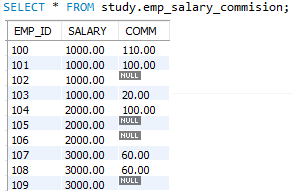| ☰ See All Chapters |
Oracle SUM Function
Oracle SUM function returns the sum of all values in the specified column. Specified column should have numeric data type, SUM function does not accept columns having a data type other than numeric, such as character or date.
If you want to sum only the unique values that show up within a table, you would use SUM function in conjunction with DISTINCT.
The syntax of the SUM function is as follows:
SELECT SUM(<column-name>) FROM TABLE_NAME; |
Oracle SUM Function Examples
Creating table for demonstrating SUM function
CREATE TABLE EMP_SALARY_COMMISION (EMP_ID NUMBER(4) , SALARY NUMBER(7,2), COMM NUMBER(7,2) );
INSERT INTO EMP_SALARY_COMMISION (EMP_ID, SALARY, COMM) VALUES ('100', '1000', '110'); INSERT INTO EMP_SALARY_COMMISION (EMP_ID, SALARY, COMM) VALUES ('101', '1000', '100'); INSERT INTO EMP_SALARY_COMMISION (EMP_ID, SALARY) VALUES ('102', '1000'); INSERT INTO EMP_SALARY_COMMISION (EMP_ID, SALARY, COMM) VALUES ('103', '1000', '20'); INSERT INTO EMP_SALARY_COMMISION (EMP_ID, SALARY, COMM) VALUES ('104', '2000', '100'); INSERT INTO EMP_SALARY_COMMISION (EMP_ID, SALARY) VALUES ('105', '2000'); INSERT INTO EMP_SALARY_COMMISION (EMP_ID, SALARY) VALUES ('106', '2000'); INSERT INTO EMP_SALARY_COMMISION (EMP_ID, SALARY, COMM) VALUES ('107', '3000', '60'); INSERT INTO EMP_SALARY_COMMISION (EMP_ID, SALARY, COMM) VALUES ('108', '3000', '60'); INSERT INTO EMP_SALARY_COMMISION (EMP_ID, SALARY) VALUES ('109', '3000');
COMMIT; |

Sum of all rows
SELECT SUM(COMM) FROM EMP_SALARY_COMMISION --------- 450
Sum of distinct rows
SELECT SUM(DISTINCT COMM) FROM EMP_SALARY_COMMISION --------- 290
Adding alias to sum value
SELECT SUM(SALARY) AS TOTAL_SALARY FROM EMP_SALARY_COMMISION;

All Chapters

